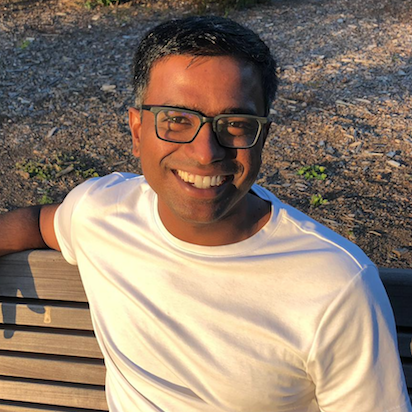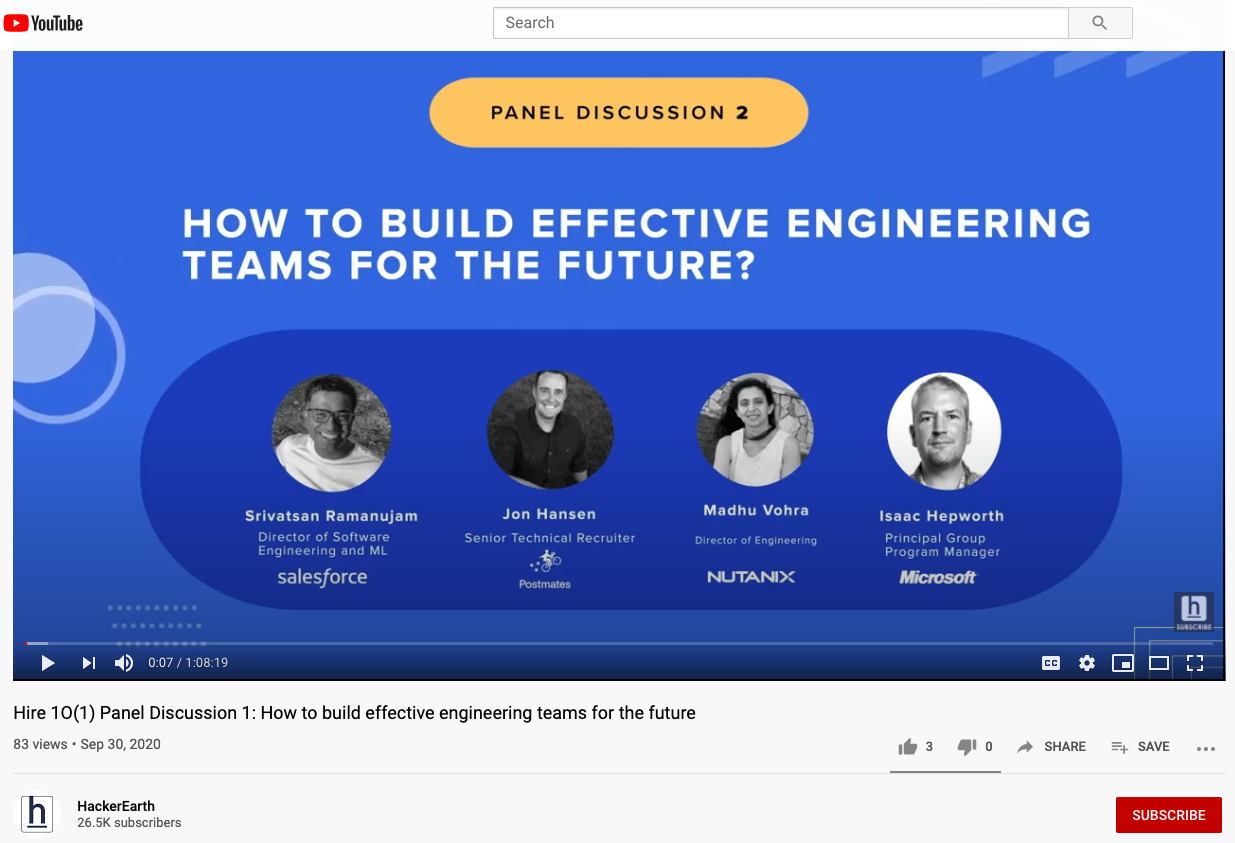I recently had the opportunity to participate in a panel discussion Hire-101 by HackerEarth, organized by the folks at HackerEarth. You can find a recording of this session below. I am also sharing some of my written responses to the questions we discussed on the panel
Has your hiring/screening process somewhat changed once COVID struck?
Like everyone else, we have gone virtual in our hiring, we are still as cordial and effective in our interviewing process online as it were in the office. I want to give a huge shout out to our recruiting team - especially those who manage our FutureForce program, who have been finding amazing new ways of engaging with prospective candidates in a virtual world. Our outreach programs have changed, our booths at University career fairs and technology conferences have also gone virtual. I was recently at the Tapia conference, which is all virtual this year. It was so exciting to interact with prospective candidates via chat and video calls, it is awkward to both the candidates and to us to hangout in a “virtual table” or as a “virtual booth” at first, but you quickly get used to it. These virtual fairs have however opened-up these events to people from all over the world. In a 3-hour booth-shift, I spoke to candidates from California, Georgia, Texas and Vietnam!
To what degree are the changes that were forced by COVID, here to stay?
I certainly miss the opportunity to meet and greet our candidates in-person or take them out to lunch and show them around our office during their visit, we hope to be able to have that opportunity again in the future, when it is safe. I miss the hallways conversations and the lunch-time banters I used to have with my teams. We understand that moving our offices to our homes is not always easy or comfortable — especially for those with families at home or to those yearning for the social interactions — Salesforce is working to address these during this time. Perhaps we may not have to be in a physical office ever single day of the week. We might be able to have a more distributed team. Perhaps you may not have to take a coast-to-coast or a transatlantic flight for every event. The virtual world has opened up* possibilities for so many talented people across the world, conferences getting sold* out in a matter of minutes or presenters/authors being unable to present at a conference because they could not get a visa may be things of the past.
How do you align recruiters and hiring managers to achieve the overall objective of hiring a talented developer?
Our recruiters help build an amazing and diverse pipeline of prospective candidates - whether it is through university recruiting, technical conferences, or events. As a hiring manager, I partner closely with our recruiter in defining the results and outcomes I expect out of a particular role, and the competencies required to achieve the same. This is not difficult for us because every employee at Salesforce has a personal V2MOM. As a hiring manager, I build the interview committee and coordinate the interviews, our recruiters help us track our candidate funnel and also help surface any time constraints our candidates may be working against (ex: a competing offer, an upcoming deadline) or any other accommodations we need to consider (a relocation, immigration process). Understanding the competitive landscape, who are we competing against.
How has remote working and hiring impacted your engineering function? Have you been managing the same level of innovation? How effective has hiring been using video interviewing tools?
Our engineering productivity has actually gone up since when we all went remote. For me, I save about 3 hours a day in not commuting to work, many of my colleagues observe the same. Now, I want to acknowledge that this may not be the case for everyone, especially parents with little children at home or anyone else who is a caregiver. What we have observed is that in fact we run the risk of overworking (not only Zoom fatigue if we do not develop a daily schedule where we give ourselves adequate breaks. For some of us, it is also about developing the personal discipline to not be “always-on”. My teams also long for the social interactions we used to have at work. Every now and then we all just hop on a zoom call just to hangout as a team - without any agenda. We have also been exploring online games (Pictionary) or Icebreaker calls for fun social events. As for hiring, I have had a couple of new hires and some summer interns whose only experience with the team and company thus far has been remote. I was amazed how much our interns were able to accomplish in 12-weeks of a remote internship. While we certainly miss the white-boarding sessions to brainstorm on an idea or the fun activities, innovation or productivity have not suffered.
What is the role of diversity in enhancing ‘effectiveness’ within engineering teams?
My personal experience has been that* not only have I learned the most* when I have been part of a diverse team but I also had the most amount of fun because there is never a dull moment. We need a team that reflects the diversity of our customers. Our customers are global, they operate in many markets, if we are building products that they use and rely on to run their business, how can we be successful by hiring “everyone like me”? Especially since at Salesforce Einstein, we are in the business of building ML powered products, we have to be cognizant of the biases in our models and the data they are trained on. You may recall about the incident from last year where a certain credit card was offering higher credit limits to men compared to women in the same household - even when both were filing taxes jointly for many years. Even last week on one of the social media platforms, many users noticed that if you had photos of two different people spliced into a long vertical image, the algorithm seemed to have a gender/racial bias in who it picks to show in the preview. Such mistakes happen even when you have a diverse team, imagine how bad it could be without one? Are we doing enough? No, not yet. Personally, I am looking out for opportunities to engage with prospective candidates in new and non-traditional venues. I don’t want to keep going to the same schools for recruiting, I want to know who are the amazing candidates we are missing out on. I will say this to the hiring managers who may be thinking that this is not a problem that affects their effectiveness. The candidates I might are ask us about this, they are holding us accountable. You cannot continue to hire great talent in the future if your team is homogenous, they will decline your offers.

